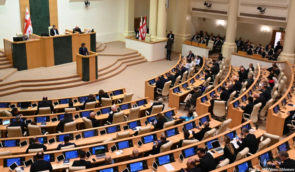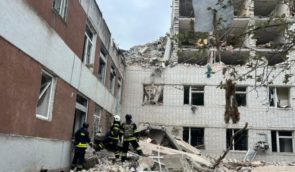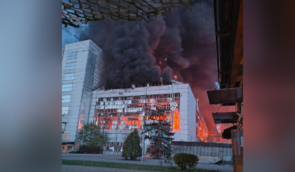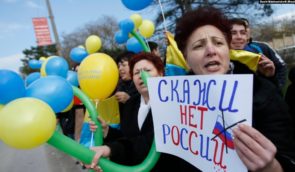Crimean prosecutor Poklonskaya leads Ukrainian ranking of enemies of press
The Institute of Mass Information and the Independent Media Trade Union of Ukraine revealed the names of annual ranking of enemies of the press freedom in Ukraine.
During April, the mass media workers filed the names of officials, who violated the right to freedom of speech and precluded the activities of journalists over the past year. Among the proposed candidates, the ranking of top 20 “enemies of the press”, who violated the rights of journalists especially roughly and often, was formed.
More than thirty media experts voted for candidates anonymously. According to the results of expert voting, Head of the Russian-occupied Crimean Prosecutor’s Office Natalia Poklonskaya topped the ranking for systematic pressure and harassment of journalists in the occupied Crimea, launch of criminal cases against Ukrainian journalists, banning the use of words “Mejlis” and “Mejlis of the Crimean Tatar People” in the media and so on. Ex-Prosecutor General of Ukraine Viktor Shokin is ranked the second for systematic inaction in investigating cases concerning attacks on journalists (including beatings during Maidan protests). MP Anton Herashchenko, media owners Rinat Akhmetov, Dmytro Firtash, Serhiy Liovochkin scored the same number of points and actually shared the third place. The tenth place is also shared by officials of the Vinnytsia and Dnipro city councils.
Top ten enemies of the press:
- Natalia Poklonskaya,Head of the Russian-occupied Crimean Prosecutor’s Office, for systematic pressure and harassment of journalists in the occupied Crimea, launch of criminal cases against Ukrainian journalists, banning the use of words “Mejlis” and “Mejlis of the Crimean Tatar People” in the media and other numerous violations of freedom of speech in the occupied Crimea.
- Viktor Shokin, Ex-Prosecutor General of Ukraine (2015-2016), second for systematic inaction in investigating cases concerning attacks on journalists (including beatings during Maidan protests)
- The third position was shared by:
–Anton Herashchenko, MP from the People’s Front Party faction, for support for publication of personal data of the journalists for alleged cooperation with terrorists, covert calls for censoring the media.
– Rinat Akhmetov, owner of “Ukraine” media group, for censorship and infomercials in the media holding, which he owns.
– Dmytro Firtash, Serhiy Liovochkin, owners of Inter TV channel, for transforming the channel’s news service into the PR service of the Opposition Bloc, corporate infomercials in the interests of the owners, pro-Russian propaganda in the entertainment and TV series content.
- Ihor Kolomoisky, owner of the “1+1” media holding, for censorship and infomercials in the media holding, which he owns.
- Serhiy Kurchenko, owner of the UMH media holding, for censorship and infomercials in the media holding, which he owns.
- Vitaliy Bohdanov, chairman of the UKROP Party faction in the Kherson City Council, for forcible non-admission of undesirable journalists to the meeting of the Kherson City Council.
- Vitaliy Honcharov, acting chief of the National Police of Ukraine in Mykolayiv region, for omission of the law enforcement in the case of preclusion of journalistic activities in Mykolayiv.
- Ihor Palytsia, chairman of the Volyn Regional Council, for illegal searches of journalists during the Regional Council’s session.
- Kostiantyn Bryl, chairman of the Zaporizhzhia Regional State Administration, for using the media in the wars with the opponents, creating campaigns against disloyal media.
- The tenth position was shared by:
– Iryna Yelizarova, head of the appeals department of the Vinnytsia City Council and its executive committee, for concealing the names of people in the published decisions of the executive committee and the sessions, who received budget funds under the guise of alleged confidentiality of the data;
– Oleksandr Sanzharov, deputy mayor of Dnipro city, for creating the conditions that prevent access to information. Responding to media queries became even more bureaucratic, delays in provision of information.








